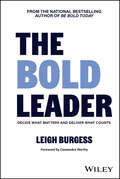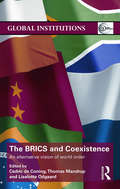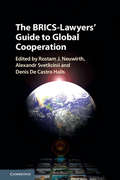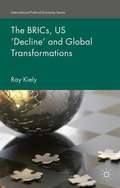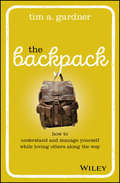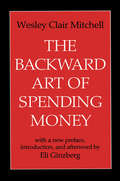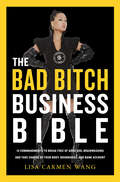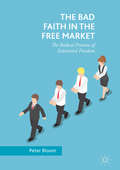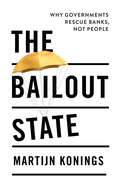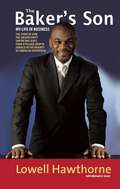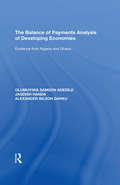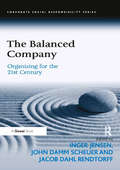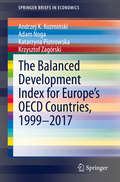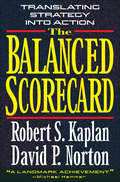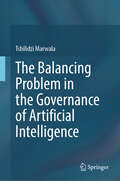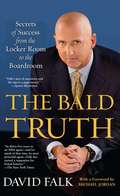- Table View
- List View
The BGIE Twenty (2021 version)
by Matthew C. Weinzierl Jeremy Friedman Vincent Pons Kristin E. Fabbe Reshmaan N. Hussam Alberto F. Cavallo Mattias E. FibigerIndustry and Background Note
The BOLD Leader: Decide What Matters and Deliver What Counts
by Leigh BurgessFrom the USA Today bestselling author of Be BOLD Today, Leigh BurgessBold leadership doesn't happen by chance, it happens by choice. Boldness isn't something you're born with. It's something you build. The BOLD Leader is the neuroscience-based leadership guide for executives, entrepreneurs, and emerging leaders ready to create high-performance momentum and the results that matter most. Grounded in real-world tools and the signature D90 Method, this book helps you improve decision-making, lead under pressure, and activate bold, strategic leadership that fuels both personal growth and sustainable success. Bestselling author and Bold Industries Group founder Leigh Burgess delivers a transformative approach informed by neuroscience, leadership psychology, and decades of lived experience. Using the BOLD Framework—Believe, Own, Learn, Design—and the D90 Method, you'll adopt a bold mindset and strategy that drives real, measurable change for yourself and your teams. Inside, you'll learn how to: Use fear as a signal, not a stop sign, to lead with clarity under pressure Navigate high-stakes conversations with trust and presence Make confident, aligned decisions without overthinking Accelerate your impact with tools to expand your capacity and sharpen your edge Create lasting momentum in just 90 days using the D90 Method The BOLD Leader gives you the mindset, structure, and tools to meet the moment and lead boldly, fueled by intention, not reaction. This is a system built for today's complexities and tomorrow's unknowns. Your next level is calling. Being bold isn't a one-time act—it's a rhythm, a standard, and now, your leadership advantage.
The BRICS and Beyond: The International Political Economy of the Emergence of a New World Order (The International Political Economy of New Regionalisms Series)
by Li XingThe world is in an era of great transformations. Globalization, transnational capitalism, September 11, the 2008 global financial crises, and the emergence of the ’second world’ in general and the BRICS in particular are characterized by a diffusion of power away from the traditional North Western powers and towards the global South. Such great transformations have reshaped the terrain and parameters of social, economic and political relations both at the national and the global levels and have exerted pressure on the exiting international order in terms of both opportunities and constraints. This new era also urges the need for re-conceptualizing the changing world order especially with regard to one of the core conceptual categories and analytical apparatus in the studies of IR and IPE - hegemony. The world will witness a new era of interdependent hegemony, in which both the existing ’First World’ and the emerging ’Second World’ are intertwined in a constant process of shaping and reshaping the international order in the nexus of national interest, regional orientation, common economic and political agenda, political alliance and potential conflicts. This collection juxtaposes, from different perspectives and approaches, the discussion on the political economy of the emerging world order with a focus on the rising powers.
The BRICS and Coexistence: An Alternative Vision of World Order (Global Institutions)
by Cedric De Coning Liselotte Odgaard Thomas MandrupThe grouping consisting of Brazil, Russia, India and China (BRIC) was initially meant to be nothing more than clever investment jargon referring to the largest and most attractive emerging economies. However, these countries identified with the BRIC concept, and started to meet annually as a group in 2008. At their fourth summit in 2011, they added South Africa to become the BRICS. By then the BRICS had fully morphed from investment jargon to a name for a new economic and political grouping that had the potential to challenge the unipolar hegemony of the United States and its Western allies. This work analyses the extent to which the concept of coexistence explains the individual foreign policies of the BRICS countries. The editors define coexistence as a strategy that promotes the establishment of a rule-based system for co-managing the global order. It recognizes that different states may legitimately pursue their own political and economic interests, but they have to do so within the bounds of a rule-based international system that ensures the peaceful coexistence of states. The BRICS and Coexistence addresses the political dimension of the emergence and influence of the BRICS in the international system and will be of interest to students and scholars of Politics, Development and International Relations.
The BRICS-Lawyers’ Guide to Global Cooperation
by Denis Neuwirth Rostam J. Alexandr Svetlicinii De Castro HalisIn the international trade and development arena, new and developing economies have created a block that is known as BRICS - Brazil, Russia, India, China and South Africa. Initially conceived to drive global change through economic growth, the financial crisis and reversal of fortunes of the BRICS nations have raised questions about their ability to have an impact on the governance of global affairs. This book explores the role of law in various areas of BRICS cooperation including: trade, investment, competition, intellectual property, energy, consumer protection, financial services, space exploration and legal education. It not only covers the specifics of each of the BRICS nations in the selected areas, but also offers innovative and forward-looking perspectives on the BRICS cooperation and their contribution to the reform of the global governance networks. This is a unique reference book suitable for academics, government officials, legal practitioners, business executives, researchers and students.
The BRICs, US ‘Decline’ and Global Transformations
by Ray KielyThe author examines the rise of the BRICs and the supposed decline of the United States. Focusing on the boom years from 1992 to 2007, and the crisis years after 2008, he argues that there are limits to the rise of the former and that the extent of US decline has been greatly exaggerated, and that there are therefore good reasons to question the view that there has been an international transformation. The book particularly focuses on how the boom years facilitated the rise of the BRICs, and how this reinforced US power, and that recovery in the global South after the financial crisis is now running out of steam. While this might be a problem for the United States, it is a problem for BRIC countries as well. Perhaps the most important development in the international order in recent years is actually the rise in global inequality.
The Back of the Napkin: Solving Problems and Selling Ideas with Pictures
by Dan RoamSolving Problems and Selling Ideas with Pictures
The Backpack: How to Understand and Manage Yourself While Loving Others Along the Way
by Tim A. GardnerA guide for being fully equipped to succeed on the journey of life The Backpack: How to Understand and Manage Yourself While Loving Others Along the Way tells the story of Jon, Sofia, and Buddy whose pathways merge on a life-changing flight. Written by a senior consultant with the Flippen Group (a world-wide leader in self-awareness training), the book brings together an angry passenger, a wise flight attendant, and a down-home cowboy. Their chance meeting leads to the ride of their lives as they fully grasp the importance and meaning of their backpacks. As this engaging story reveals, self-awareness is like a backpack! If we are to be prepared to succeed on the journey of life, we need to know and accept which backpack is ours, decide what we need to put in it or take out of it, and be fully aware of how our backpacks are affecting all of the other passengers around us. The question is: Are we whacking the other passengers with our backpack as we travel through life. . . or are we helping them? Offers life lessons on self-awareness written in the form of a funny and engaging story Shows how we can lighten, fill and understand our “backpack” in order to lead a more successful life Written by a senior consultant with the Flippen Group The Backpack offers a story that explores the concepts of self-awareness and other-awareness, including the importance of appreciating your personality, living by your core values, mentally preparing for your day, being aware of your impact on others and packing your backpack wisely.
The Backward Art of Spending Money
by Eli Ginzberg Wesley Clair MitchellNearly 85 years ago, Wesley Clair Mitchell, the acknowledged leader of American economists during the first half of this century, wrote: "Important as the art of spending is, we have developed less skill in its practice than in the practice of making money. Common sense forbids our wasting dollars earned by irksome efforts; and yet we are notoriously extravagant. Ignorance of qualities, uncertainty of taste, lack of accounting, carelessness about pricesà. Many of us scarcely know what becomes of our moneyà."More than ever, in our world of ever-increasing credit card debt, lenient bankruptcy laws, and runaway consumption, these words still ring true. This collection of Mitchell's essays, makes it easier for today's and tomorrow's economists and social scientists to become acquainted with Mitchell's many contributions to the study of the American economy.Regrettably, the passage of time can blur and even obliterate the reputation and achievements of yesterday's leaders of ideas and actions. Although the National Bureau of Economic Research, which Mitchell helped to found and which he led in the 1920s and 1930s, remains a leading research institution, relatively few of its associates, who represent the elite among U.S. academic economists, have any first-hand acquaintance with Mitchell's work. Eli Ginzberg rounds out this edition with Mitchell's comprehensive analysis of "Business Cycles," first published in 1929, an area that commanded most of his scholarly efforts. Ginzberg's essay on Mitchell, written in 1931 and published for the first time in 1997, serves as an appropriate introduction to this new edition. His afterword contains remarks delivered at the 50th anniversary of Mitchell's death at the meeting of the Allied Social Sciences Association held in Chicago early in 1998, a telling tribute to this undisputed giant in the field.Wesley Clair Mitchell (1874û1948) held major teaching posts at the University of California and Columbia University. One of the most eminent U.S. economists, Mitchell focused much of his research on the statistical investigation of business cycles. His two major works are Business Cycles (1913) and Business Cycles: The Problem at its Setting, (1927).Eli Ginzberg is A. Barton Hepburn Professor Emeritus at the Graduate School of Business, and Director of the Eisenhower Center for the Conservation of Human Resources at Columbia University.
The Bad Bitch Business Bible: 10 Commandments to Break Free of Good Girl Brainwashing and Take Charge of Your Body, Boundaries, and Bank Account
by Lisa Carmen WangChampion gymnast turned serial entrepreneur and investor Lisa Carmen Wang empowers women to break free of Good Girl Brainwashing—perfectionism, people-pleasing, permission-asking—to become their most authentic and powerful selves.“A woman steps into her full power not when she is finally given permission to do so, but when she realizes she never needed it in the first place.”Lisa Carmen Wang was raised to be a good girl, praised for her obedience, politeness, modesty—traits that became the bedrock of her personality. But as she grew up, the never-ending pursuit of being the perfect good girl left her feeling hollow, despite her achievements as a champion gymnast, straight-A student, and Ivy League graduate. Her fears of failure and rejection and her worries about other peoples’ opinions held her back from embracing her most authentic and powerful self at work and in life.But all that changed when Lisa realized she was capable of so much more; that deep inside a Bad Bitch was waiting to be unleashed.The culmination of decades of training as an elite athlete, business leader, serial entrepreneur, and certified executive coach, The Bad Bitch Business Bible is Lisa’s no-holds-barred guide for women who want to break free of Good Girl Brainwashing and take charge of their bodies, boundaries, and bank accounts. Interweaving intimate personal stories with large life lessons, Lisa shows you how to transform from insecure good girl to unapologetic Bad Bitch so you can start earning the money, power, and respect you deserve. Whether you’re launching your first business, transitioning in your career, trying to find your community, or making a life change, The Bad Bitch Business Bible is an invaluable resource that teaches you how to tap into the most powerful version of yourself and become the Bad Bitch you were born to be.
The Bad Faith in the Free Market: The Radical Promise Of Existential Freedom
by Peter BloomInnovatively combining existentialist philosophy with cutting edge post-structuralist and psychoanalytic perspectives, this book boldly reconsiders market freedom. Bloom argues that present day capitalism has robbed us of our individual and collective ability to imagine and implement alternative and more progressive economic and social systems; it has deprived us of our radical freedom to choose how we live and what we can become.Since the Great Recession, capitalism has been increasingly blamed for rising inequality and feelings of mass social and political alienation. In place of a deeper liberty, the free market offers subjects the opportunity to continually reinvest their personal and shared hopes within its dogmatic ideology and policies. This embrace helps to temporarily alleviate growing feelings of anxiety and insecurity at the expense of our fundamental human agency. What has become abundantly clear is that the free market is anything but free.Here, Bloom exposes our present day bad faith in the free market and how we can break free from it.
The Bad News about the News
by Robert G. KaiserThe digital revolution has forever changed American journalism, and not for the better. Robert Kaiser, former managing editor of The Washington Post, writes in his new Brookings Essay that the changing media landscape is not only a threat to traditional news, but to the future of democracy. A news industry without a viable business model, distracted by the need to attract eyeballs and discover new revenue streams, could lose the ability to provide the balanced, comprehensive, and investigative journalism that is the lifeblood of a healthy democracy.THE BROOKINGS ESSAY: In the spirit of its commitment to high-quality, independent research, the Brookings Institution has commissioned works on major topics of public policy by distinguished authors, including Brookings scholars. The Brookings Essay is a multi-platform product aimed to engage readers in open dialogue and debate. The views expressed, however, are solely those of the author. Available in ebook only.
The Bad News about the News
by Robert G. KaiserThe digital revolution has forever changed American journalism, and not for the better. Robert Kaiser, former managing editor of The Washington Post, writes in his new Brookings Essay that the changing media landscape is not only a threat to traditional news, but to the future of democracy. A news industry without a viable business model, distracted by the need to attract eyeballs and discover new revenue streams, could lose the ability to provide the balanced, comprehensive, and investigative journalism that is the lifeblood of a healthy democracy. THE BROOKINGS ESSAY: In the spirit of its commitment to high-quality, independent research, the Brookings Institution has commissioned works on major topics of public policy by distinguished authors, including Brookings scholars. The Brookings Essay is a multi-platform product aimed to engage readers in open dialogue and debate. The views expressed, however, are solely those of the author. Available in ebook only.
The Bahamas: Statistical Appendix
by International Monetary FundA report from the International Monetary Fund.
The Bailout State: Why Governments Rescue Banks, Not People
by Martijn KoningsHow did we end up in a world where social programs are routinely cut in the name of market discipline and fiscal austerity, yet large banks get bailed out whenever they get into trouble?In The Bailout State, Martijn Konings exposes the inner workings of this sprawling infrastructure of government guarantees. Backstopping financial markets and securing banks’ balance sheets, this contemporary Leviathan manages the inflationary pressures that its generosity produces by tightening the financial screws on the rest of the population. To a large extent, the bailout state was built by progressives seeking to buttress the institutions of the early postwar period. The resulting tide of capital gains fostered an asset-centered politics that experienced its heyday in the nineties. But ever since the financial crisis of 2007-08, promises of inclusive economic growth have looked increasingly thin. A colossus locked in place, the bailout state disburses its benefits to a rapidly shrinking group of property owners. Against the backdrop of a ferocious post-pandemic turn to anti-inflationary policy, the only remaining way to exit the logic of the bailout, Konings argues, is to challenge the monetary drivers at the heart of capitalist society.
The Baker Chocolate Company: A Sweet History
by Anthony M. SammarcoDiscover the true story behind America&’s first chocolate company, formed in pre-Revolutionary New England. In 1765, the story goes, Dr. James Baker of Dorchester, Massachusetts, stumbled upon a penniless Irish immigrant named John Hannon, who was crying on the banks of the mighty Neponset River. Hannon possessed the rare skills required to create chocolate—a delicacy exclusive to Europe—but had no way of putting this knowledge to use. Baker, with pockets bursting, wished to make a name for himself—and the two men would become America&’s first manufacturers of this rich treat, using a mill powered by the same river upon which they met. Local historian Anthony Sammarco details the delicious saga of Massachusetts&’s Baker Chocolate Company, from Hannon&’s mysterious disappearance and the famed La Belle Chocolatiere advertising campaign to cacao bean smuggling sparked by Revolutionary War blockades. Both bitter and sweet, this tale is sure to tickle your taste buds.
The Baker's Son: My Life In Business
by Lowell HawthorneAn inspirational rags-to-riches memoir by one of the most successful Caribbean-born businessmen living in America. "At 21, Hawthorne's parents shipped him off to New York, where his older siblings had already relocated. He eventually found a job, started college, and began to build the multi-million dollar business Golden Krust, whose Jamaican patties are a New York staple. Hawthorne's story is compelling on many levels: it offers a peek into life in Jamaica, a classic immigrant narrative, and a testament to the strength of family. Hawthorne's is a Horatio Alger tale with a Caribbean flavor, which should find an appreciative audience among entrepreneurs and business aficionados." --Library Journal "The American question gets a great, real-life look in The Baker's Son ... Hawthorne's story is at once inspirational and revelatory." --Publishers Weekly "In his memoir, The Baker's Son, Hawthorne shares how an idea inspired by his father's bakery in Border, Jamaica, grew into the 120-branch Golden Krust Caribbean Bakery and Grill. After 23 years of selling patties, pastries, sandwiches and more through Golden Krust, Hawthorne hasn't lost sight of his values." --New York Daily News "The Baker's Son is a deeply moving account that tells the story of an immigrant family from rural Jamaica that relocated to the Bronx in 1980s... the Hawthorne family has scaled the heights of success to achieve the American Dream to an unprecedented degree." --The Philadelphia Tribune "In gripping narrative that is both inspirational and instructive, Lowell Hawthorne shares how an idea infused with tenacity, intellect, and passion can become a dream realized. The Baker’s Son offers a successful playbook for any entrepreneur who seeks to play on the rough-and-tumble field of business--and win.”--Earl “Butch” Graves, Jr., President and CEO, Black Enterprise "Lowell Hawthorne's chronicle of the development of a small Jamaican business into the highly successful Golden Krust Caribbean Bakery and Grill, an American business empire, is an invaluable guide to business success as well as an inspiring autobiographical work."—P.J. Patterson, former prime minister of Jamaica The Baker's Son is a memoir by the founder of Golden Krust Caribbean Bakery & Grill, the hugely successful Jamaican owned and run enterprise that reaches from New York to Florida with over 120 franchise locations. Starting from humble beginnings, and after weathering several major crises along the way, the Hawthorne family has scaled the heights of success to achieve the American Dream to an unprecedented degree. Today the Golden Krust brand represents the most lucrative Caribbean business ever established in America and one of the most profitable black businesses operating in the United States. Lowell Hawthorne is the president and CEO of Golden Krust Caribbean Bakery & Grill. He lives in Westchester, New York.
The Balance of Payments Analysis of Developing Economies: Evidence from Nigeria and Ghana
by Olumuyiwa Samson Adedeji Handa Jagdish Alexander Bilson DarkuDeveloping countries - given their extreme economic vulnerability - are likely to be better served by maintaining flexible exchange rate regimes. That is the finding of this informative and enlightening book. Presenting unique theoretical and econometric analysis of the current account of the balance of payments of Nigeria and Ghana, this book examines the features common to the economic position of developing countries (such as recurring deficits and continual increases in external debt). The book presents a number of new theoretical modifications to the standard version of the value model of the current account, in order to reflect the major characteristics of developing economies. The book also uses rigorous econometric analyses to determine the validity of theoretical models, and examines the sustainability of these various countries' current account deficits.
The Balanced Company: Organizing for the 21st Century (Corporate Social Responsibility)
by Inger Jensen John Damm ScheuerToday’s organizations are embedded in global and local network relationships that demand more. They have to consider the importance to customers, investors and employees of being respected in wider society and behaving ethically, so it is increasingly important for companies to reflect systematically on how to balance profits with other criteria when making decisions and acting. In short, they need to learn how to become The Balanced Company. Requiring sustainability in production processes and ethical employment of the work force in suppliers' production facilities, at home and abroad, has resulted in new challenges. Strategists need to make balanced choices about long-term goals and the allocation of resources. They must analyse, understand and adjust strategies to market, political, value and technology-related changes. Communication specialists need to take the value systems and assumptions of stakeholders into consideration. Change specialists need to balance continuity and change. Meanwhile, managers make balanced decisions about control or trust; human resources design jobs to make them attractive as well as motivating, and marketers must consider what is important to consumers and stakeholders. Last but not least, leaders have to acknowledge that there are times when organizations have to be taken out of balance during change. The Balanced Company provides answers to corporately responsible and ethically driven balanced decision making. Read it to help your company and stakeholders identify what can be achieved and what to avoid, and about the processes by which values are taken into account and applied in practice.
The Balanced Development Index for Europe’s OECD Countries, 1999–2017 (SpringerBriefs in Economics)
by Andrzej K. Koźmiński Adam Noga Katarzyna Piotrowska Krzysztof ZagórskiThis book presents the Balanced Development Index (BDI), measuring socioeconomic development in twenty-two European OECD member countries in a period 1999-2017. Compared to other composite measures of development, BDI looks beyond traditional development indicators, such as GDP, to create an index which gives equal weight to social, economic, objective, and subjective aspects of development. The BDI aggregates forty-two detailed indicators into four composite middle-level indexes: external economic (characterizing functioning of national economies in their international surroundings), internal economic (characterizing various aspects of domestic economic conditions), social expectations (public hopes and fears concerning economic, political and social conditions), and current social condition (including both objective and subjective social indicators)—which are, in turn, aggregated into the general BDI index.
The Balanced Scorecard
by Robert S. Kaplan David P. NortonThe Balanced Scorecard translates a company's vision and strategy into a coherent set of performance measures. The four perspectives of the scorecard--financial measures, customer knowledge, internal business processes, and learning and growth--offer a balance between short-term and long-term objectives, between outcomes desired and performance drivers of those outcomes, and between hard objective measures and softer, more subjective measures. In the first part, Kaplan and Norton provide the theoretical foundations for the Balanced Scorecard; in the second part, they describe the steps organizations must take to build their own Scorecards; and, finally, they discuss how the Balanced Scorecard can be used as a driver of change.
The Balancing Act: How Design-Thinking Organizations Embrace Reliability and Validity--Creating an Environment That Fosters Innovation
by Roger L. MartinDesign-thinking organizations remain a small minority in the corporate world, and on the whole are relatively small themselves. Bankers want to see budget projections and proof that they will be met, boards reject initiatives that can't be proved prior to experience, and shareholders demand that the company meet its profit goals every quarter without fail. This may satisfy short-term expectations, but in the long run, companies that focus on reliable outcomes grow stagnant and fall prey to new competitors who are willing to push the limits. To break away from the competition, businesses need to build an environment that fosters creativity. This chapter highlights the way in which an organization's structure, processes, and norms can help or hinder design thinking. The author examines the case of Herman Miller and its unique design approach. This chapter was originally published as Chapter 5 of "The Design of Business: Why Design Thinking Is the Next Competitive Advantage."
The Balancing Problem in the Governance of Artificial Intelligence
by Tshilidzi MarwalaThis book examines the balancing problems in the governance of artificial intelligence (AI). AI is transforming the world at an unprecedented pace, which is revolutionary and presents significant challenges. Nevertheless, AI's complex balance dilemma necessitates careful governance as it transforms businesses, economies, and society. Fundamental issues discussed in this book include the complexities of AI's dual nature, the challenges of aligning memorizing with thinking, and the trade-offs between opportunity seeking and risk aversion. This book explores the complex interplay between AI security and transparency, the technical decision between CPUs and GPUs, and the expanding potential of quantum computing. Nevertheless, the challenge of maintaining balance is not resolved by technological advancements. It encompasses the global arena, where the forces of globalization and localization must be reconciled, and the governance sphere, where self-regulation must coexist with government control. Comprising cutting-edge research, real-world examples, and futuristic perspectives, this book guides researchers, practitioners, politicians, entrepreneurs, and leaders in navigating AI's future. The reader will learn how to capitalize on the potential of AI while avoiding its weaknesses, ensuring that this disruptive technology benefits society.
The Bald Truth
by David FalkThe man who called the shots for some of the greatest heroes in the history of basketball reveals the innovative business secrets that catapulted him to the top of his game.Basketball Digest called superagent David Falk one of basketball's most influential people, second only to NBA commissioner David Stern. Falk has represented more NBA first-round draft selections, lottery picks, Rookies-of-the-Year, and All-Stars than anyone else in the business. Now, he shares the fascinating insider details of how he negotiated lucrative contracts for superstars like Michael Jordan and Alonzo Mourning (changing the NBA's entire salary structure in the process), learned from his mistakes, and branded and marketed some of the greatest basketball players in history as the fledgling team sport grew into a multibilliondollar business.hout the industry as an innovator, candidly unveils the business secrets that have fueled his extraordinary success. For the first time, he shares the fascinating insider details of how he negotiated lucrative contracts, learned from his mistakes, and branded and marketed not only the greatest basketball stars in history but also other elite athletes and coaches. Falk is blunt, he's fair, and he looks at the long run rather than the short-term gains. To make a great deal, he believes, both sides have to win. He adheres to steadfast principles, some of which he learned from the celebrated champion athletes and revered coaching legends -- like Georgetown's John Thompson and Duke's Mike Krzyzewski -- who have been long-standing clients and lifelong friends. Since Falk began representing athletes more than thirty-five years ago, basketball has grown from a fledgling team sport to a multibilliondollar business with celebrity players, powerful endorsement deals, salary caps, and ever-evolving free agency rules. He has made millions of dollars for himself and his clients, but today he remains in the business for one reason: love of the game -- on and off the court.

